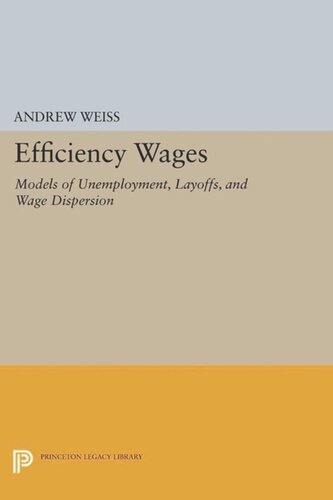

Most ebook files are in PDF format, so you can easily read them using various software such as Foxit Reader or directly on the Google Chrome browser.
Some ebook files are released by publishers in other formats such as .awz, .mobi, .epub, .fb2, etc. You may need to install specific software to read these formats on mobile/PC, such as Calibre.
Please read the tutorial at this link: https://ebookbell.com/faq
We offer FREE conversion to the popular formats you request; however, this may take some time. Therefore, right after payment, please email us, and we will try to provide the service as quickly as possible.
For some exceptional file formats or broken links (if any), please refrain from opening any disputes. Instead, email us first, and we will try to assist within a maximum of 6 hours.
EbookBell Team

4.8
74 reviewsKnown for his seminal work in efficiency-wage theory, Andrew Weiss surveys recent research in the field and presents new results. He shows how wage schedules affect the kinds of workers a firm employs and how well those workers perform on the job. Using straightforward examples, he demonstrates how efficiency-wage theory can explain labor market outcomes and guide government policy. There is a separate section of applications to less developed countries. "Efficiency-wage models represent one of the most important developments in economic theory of recent years. They have, at last, provided integrated explanations both of macroeconomic phenomena, such as unemployment and wage rigidity, and microeconomic phenomena, such as wage dispersion. Weiss--one of the pioneers of efficiency-wage theory--provides here a masterful survey, a lucid and systematic and yet critical account of this rapidly developing branch of economics. This book should be required reading in all courses in macroeconomics."--Joseph Stiglitz, Stanford University "Efficiency Wages should be on the bookshelf of all labor and macroeconomists."--Lawrence H. Summers, Harvard University "A splendid monograph ... most readable... I will put it on my reading list."--Partha Dasgupta, Stanford University
Originally published in 1991.
The Princeton Legacy Library uses the latest print-on-demand technology to again make available previously out-of-print books from the distinguished backlist of Princeton University Press. These editions preserve the original texts of these important books while presenting them in durable paperback and hardcover editions. The goal of the Princeton Legacy Library is to vastly increase access to the rich scholarly heritage found in the thousands of books published by Princeton University Press since its founding in 1905.